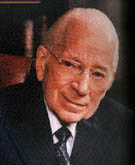
Understanding the Worldwide Church of God
 The Worldwide Church of God was founded by Herbert W. Armstrong (1892-
The Worldwide Church of God was founded by Herbert W. Armstrong (1892-
Brought up in a traditional Sunday School, he had seen faith as a mere belief, not a way of life. Through the influence of a neighbour, he and his wife joined "the Church of God (Adventist)", a group that broke from the Seventh-Day Adventist Church in 1889. After a stormy experience in this church, he left in a breakaway which formed "the Church of God (Seventh-Day)". Later, because of his acceptance of the British-Israel theory (that the British represent the "lost tribes" of Israel and inherit all the unfulfilled promises made to the northern kingdom of Israel (a theory which has been held by people in a variety of denominations but which is discredited by both Scripture and history) and other subjects, he went out on his own and formed his own church, calling it "The World Church of God," now known as the Worldwide Church of God.
Armstrong founded Ambassador College in Pasadena, California, Plain Truth magazine (started in February 1934) and The World Tomorrow programme (originating in Eugene, Oregon in January l934). The Worldwide Church of God now sponsors more radio broadcasts and television programmes on more stations than any other cultic group in the world - in fact more than its top five competitors combined! Armstrong has made it a career to become a senior statesman of diplomacy for his church, visiting the leaders of established and emerging nations, attracting their attention by his expensive gifts and direct aid programmes. He has, for example, sponsored archaeological digs for the Israeli government, including excavations around and underneath the site of the second temple in Jerusalem.
Armstrong teaches that his is the only true church and that all other churches are apostate and part of "Mystery, Babylon the Great." He objects to the doctrine of the Trinity "because it limits God to Three Persons" - he teaches that, on "true conversion," a person is "begotten of God" and that, at the time of the resurrection, he will actually "become God." He denies that the Holy Spirit is a Person. He describes salvation on the basis of faith in Christ at false - "the blood of Christ does not finally save any man" - insisting on obedience to "God's spiritual law, the ten commandments."
The theology of Armstrong contains just enough truth to make it attractive to the unsuspecting listener, but is a cruel deception that leads people away from the plain truth of Scripture and the salvation freely offered to us in Christ.
© Peter J Blackburn, 1991,1999. This material was originally prepared for Antioch School. Permission is given for the printing and use of this material by congregations and individuals.